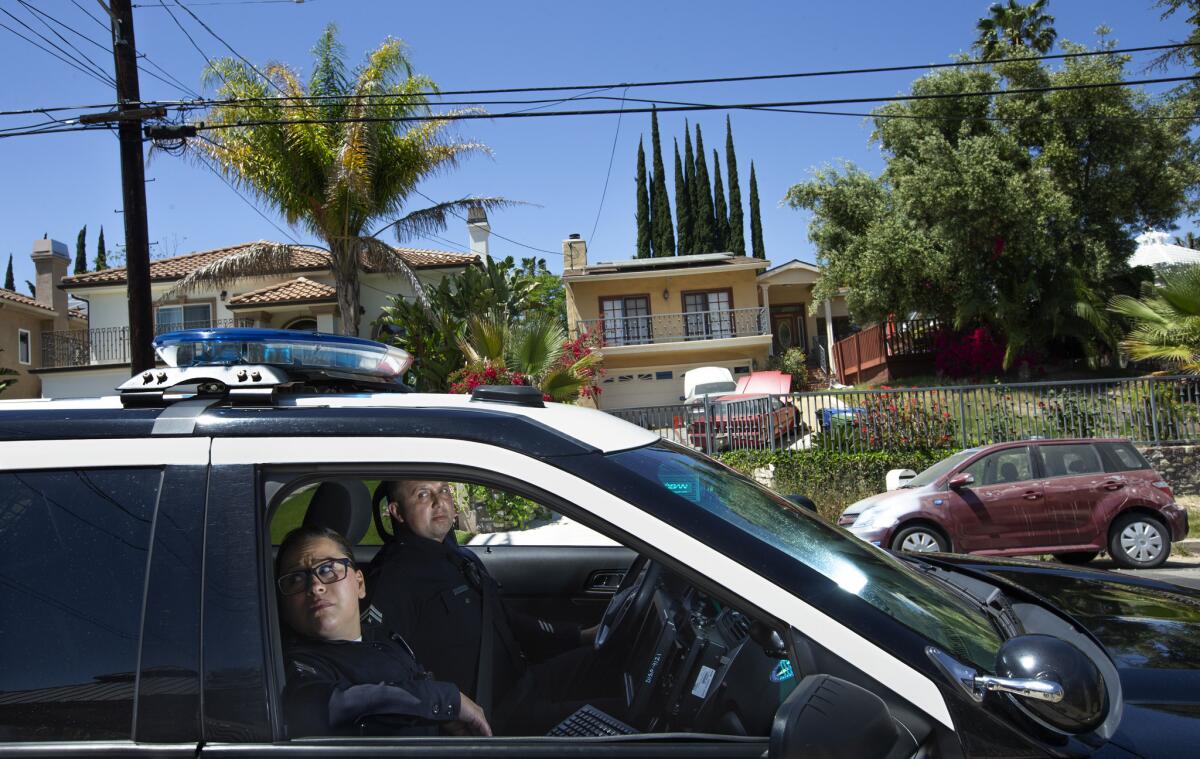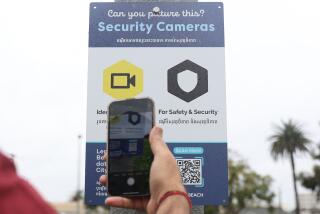LAPD changing controversial program that uses data to predict where crimes will occur

Los Angeles Police Department leaders announced changes Tuesday to a controversial program that predicts where property crimes could occur throughout the city.
The changes come seven months after an inspector general couldnât determine whether the departmentâs predictive-policing program, called PredPol, helped reduce crime. Critics contend the program leads to heavier policing of minority neighborhoods.
Chief Michel Moore told a meeting of the L.A. Police Commission that the LAPD needs location-based strategies to target crime and keep residents safe. Moore said the department will adjust programs when needed and that he disagrees with critics who believe the program unfairly targets Latino and black neighborhoods.
âThe manner of how we use data is informed by the evolution of technology,â Moore said. âWeâre going to smartly use our precious resources.â
The Times reported in July that the widely hailed tool, which the LAPD helped create, has come under fire in the past two years, with numerous departments across the country ending use of the software because they determined it did not help reduce crime and essentially provided information already being gathered by officers patrolling the streets.
PredPol was designed to predict in real time where and when crimes were likely to occur over the next 12 hours. The softwareâs algorithm examines 10 years of data, including the types of crimes and the dates, times and locations where they occurred. It then generates 10 âboxes,â each about 500 feet by 500 feet, designated as zones for possible property crimes such as burglaries and car thefts.
Coming changes include creating a data-driven policing unit to oversee all crime-fighting strategies and seeking input from various community groups before implementing new data programs.
The department also said it would develop a system to provide periodic reports about data programs and outcomes with statistics on people and locations targeted for intervention. Officers will also stop logging on to computers to record the time they spend in the PredPol zones.
In the next few weeks, the department will finalize a manual to guide the program, Assistant Chief Robert Arcos told commissioners. Once it is approved and officers are trained, Arcos said he expects results can be measured in early 2020. The LAPD emphasized a âcommunity focusâ while working to reform the program, Arcos said.
Moore and Arcos repeatedly pointed out that the program only predicts locations of property crimes and does not use information to identify suspects or people living in the areas where crimes could occur.
Commissioner Sandra Figueroa-Villa recused herself from the meeting before the panel discussed the data program. The Times reported in August that Figueroa-Villaâs nonprofit organization accepted a $7,500 donation from the technology company in 2014 when the firm was looking to expand within the LAPD.
Figueroa-Villa, who said she accepted the money at the request of Mayor Eric Garcetti, never disclosed the donation in prior meetings.
Meanwhile, Commission President Eileen Decker asked Inspector General Mark Smith to continue to provide oversight of the predictive program to make sure it doesnât disproportionately impact communities.
âWeâll want to monitor it to evaluate the effectiveness,â she said.
Beyond concerns from law enforcement agencies, data-driven programs are also under increasing scrutiny by privacy and civil liberties groups, which say the tactics result in heavier policing of black and Latino communities.
In March, an LAPD internal audit concluded there were insufficient data to determine if the PredPol software â developed by a UCLA professor in conjunction with the LAPD â helped to reduce crime. Smith said there also were problems with a component of the program used to pinpoint the locations of some property crimes.
Smithâs office could not determine whether the program helped reduce crime and said the department lacked sufficient oversight of the program. The coming changes, Smith said, will bring oversight.
Commissioner Dale Bonner said he wants to examine the program manual and is âencouraged by the focus on greater oversight.â
Tuesdayâs meeting was briefly halted after some attendees became disruptive during the public comment period.
Most spectators remained in the room, despite an order to leave. Hamid Khan, a leader of the Stop LAPD Spying Coalition, addressed the crowd, saying that the LAPDâs decisions to scale back on predictive policing and stop using words like âdosageâ were âsanitizingâ programs that would continue to target black and Latino residents.
âWeâve got to keep on disrupting this. Weâve got to dismantle this,â said Khan, who sent the commission a letter in which more than 400 academics discredited the PredPol program. âThere is no kinder, gentler predictive policing system. It is racist.â
The commission eventually ended the public meeting and moved to closed session items. The crowd left the room after a police officer declared an unlawful assembly.
Commissioners later returned to public session and voted 3-0 to accept changes to the PredPol program and continue the meeting without the public.
Commissioner Shane Murphy Goldsmith was absent.
More to Read
Sign up for Essential California
The most important California stories and recommendations in your inbox every morning.
You may occasionally receive promotional content from the Los Angeles Times.












